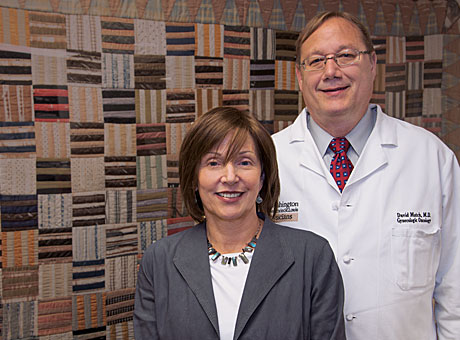
David G. Mutch, MD, chief of gynecologic oncology, with Ina Sachar, who has benefited from new therapies and research.

David G. Mutch, MD, chief of gynecologic oncology, with Ina Sachar, who has benefited from new therapies and research.
“I don’t have time for cancer,” says Ina Sachar, who has lived with cancer for 20 years. Instead, the 66-year-old St. Louis resident has four grandchildren to spoil and places she wants to travel. She embodies the strength of the human spirit and the advances made to eradicate cancer.
Sachar has battled cancer since 1993 — first breast cancer, then ovarian, endometrial and colon cancer.
While the ovarian cancer has recurred, she has fought back each time with new drug therapies that have become available over the past two decades.
“I’ve been the beneficiary of targeted therapies and the research that’s been done at Washington University and the Siteman Cancer Center,” Sachar says.
The university has 35 different gynecologic oncology clinical trials open and active. Washington University researchers are among the largest contributors to a national consortium, the Gynecologic Oncology Group.
“We have very good therapies because of all the clinical trials and genomic research done at Washington University,” says David G. Mutch, MD, chief of the division of gynecologic oncology, where six oncologists all work together. “We can practice state-of-the-art care because we are at a great university where all areas are excellent.”
Because of their record of excellence in patient care and research, Washington University and Siteman Cancer Center received the National Cancer Institute’s first Specialized Program of Research Excellence (SPORE) grant to accelerate research into causes and treatments for endometrial cancer. The multi-year grant, awarded in 2010, is showing results.
“We’ve identified more accurate, cost-effective ways to screen patients for an inheritable form of endometrial cancer that could be available to the public in the next year or so,” says Mutch, the Ira C. and Judith Gall Professor of Obstetrics and Gynecology. “We’re also learning more about the molecular makeup of this cancer and the gene mutations that impact the success or failure of treatment options.”
Research has correlated a genetic link between ovarian and breast cancer and between inherited versions of endometrial cancer and colon cancer. More effective, targeted treatments for gynecologic cancers might benefit all cancer patients.
Says Sachar, “The reason to fund research like this is that they will find secrets to many cancers.”